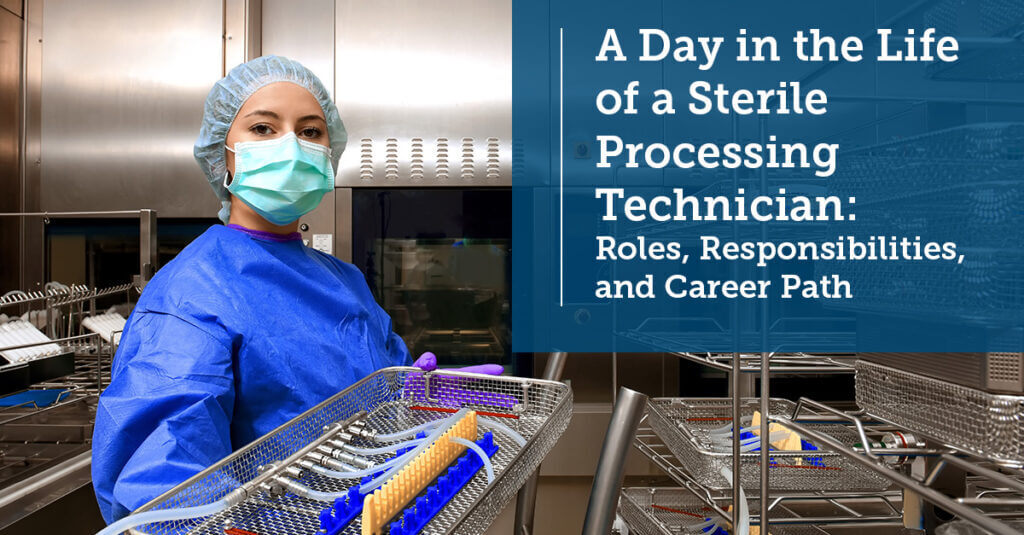A Day in the Life of a Sterile Processing Technician: Roles, Responsibilities, and Career Path
A Day in the Life of a Sterile Processing Technician: Roles, Responsibilities, and Career Path
In the bustling world of healthcare, every role is crucial. Yet, some remain less known but equally vital. One such role is that of a Sterile Processing Technician. These professionals are the unsung heroes of the medical world. They ensure that every instrument used in a medical procedure is impeccably clean and safe.
Their work is a blend of precision, knowledge, and diligence. It’s a role that demands a keen eye for detail and a deep understanding of sterilization processes. In this article, we explore sterile processing roles and responsibilities, along with the career paths of those in this field.

Table of Contents
Understanding the Role of a Sterile Processing Technician
A Sterile Processing Technician plays a pivotal role in healthcare. They are responsible for the sterilization and decontamination of medical instruments. Their work is crucial in preventing infections. They ensure that every tool used in surgeries and other procedures is free from harmful microorganisms.
They work behind the scenes, often in the basement or a separate wing of a healthcare facility. Despite their unseen role, their work directly impacts patient care and surgical outcomes. Their duties extend beyond sterilization. They are also responsible for inventory management, record-keeping, and ensuring compliance with health and safety standards.
In essence, sterile processing is critical to ensuring the safety of patients by providing properly processed and well-functioning medical devices (Prust, J., 2024).
The Essential Daily Tasks of a Sterile Processing Technician
A Sterile Processing Technician’s day is filled with a variety of tasks. These tasks are critical to the smooth operation of a healthcare facility.
The first task of the day is often to check the sterilization equipment. This includes autoclaves and other sterilization machines. They ensure that these machines are functioning properly and are ready for use.
Next, they receive used medical instruments from surgeries and other procedures. These instruments are often covered in biological material and must be carefully handled to prevent contamination.
The instruments are then sorted and pre-cleaned. This involves removing visible debris and soaking the instruments in a special solution. After pre-cleaning, the instruments are thoroughly washed and inspected. This is a meticulous process that requires a keen eye for detail.
The clean instruments are then sterilized. This is done using heat, steam, or chemicals, depending on the type of instrument. Once sterilized, the instruments are dried, inspected again, and then packaged for use. They are then stored in a clean and organized manner, ready for the next procedure.
Throughout the day, Sterile Processing Technicians also manage inventory, update records, and communicate with other departments. They ensure that all sterilized instruments are accounted for and ready for use when needed.
Ensuring Patient Safety: The Sterilization Process
Patient safety is at the heart of a Sterile Processing Technician’s role. One of the key ways they ensure this is through the sterilization process. Sterilization is the process of eliminating all forms of microbial life, including bacteria, viruses, and spores. This is crucial in preventing infections and ensuring patient safety during medical procedures.
Sterile Processing Technicians use various methods of sterilization. These include heat, steam, and chemical sterilants. The choice of method depends on the type of instrument and its heat sensitivity.
For instance, autoclaves use high-pressure steam to sterilize instruments. This method is effective but can damage heat-sensitive instruments. For these, chemical sterilants or low-temperature sterilization methods are used. After sterilization, each instrument is carefully inspected. Technicians look for any signs of damage or remaining debris. Only then are the instruments deemed safe for use.
In this way, Sterile Processing Technicians play a vital role in patient safety. They ensure that every instrument used in a medical procedure is free from harmful microbes.
Key Skills and Attributes for Success in Sterile Processing
Success in sterile processing requires a unique set of skills and attributes. One of the most important is attention to detail. Technicians must be able to spot tiny bits of debris on instruments. They must also notice any signs of damage or wear.
Organizational skills are also crucial. Technicians must keep track of many instruments. They need to ensure each one goes through the correct sterilization process. They also need to keep accurate records of each instrument’s sterilization history.
Physical stamina is another key attribute. Technicians often spend long hours on their feet. They may also need to lift heavy trays of instruments.
Soft skills, such as problem-solving and adaptability, are also important. Technicians often need to troubleshoot issues with sterilization equipment. They must also adapt to changes in sterilization protocols and procedures.
Finally, a strong work ethic and dedication to patient safety are essential. Technicians play a vital role in preventing infections and ensuring safe medical procedures.
The Path to Becoming a Sterile Processing Technician
The sterile processing technician career path is a specific one. It starts with a high school diploma or equivalent. Some technicians also have a background in healthcare or science.
Next, aspiring technicians typically complete a sterile processing technician program. These programs are often offered by community colleges or vocational schools. They cover topics like microbiology, infection control, and medical terminology.
After completing their education, technicians must pass a certification exam. There are several organizations that offer these exams. They include the Certification Board for Sterile Processing and Distribution (CBSPD) and the International Association of Healthcare Central Service Materiel Management (IAHCSMM).
Certification is not always required to work as a technician. However, many employers prefer or require it. Certification also demonstrates a technician’s commitment to their profession.
Finally, technicians often start their careers in entry-level positions. They gain experience and learn more about the field. Over time, they may have opportunities for advancement.
Educational Requirements and Certifications
The educational requirements for Sterile Processing Technicians vary. Some technicians have a high school diploma or equivalent. Others have an associate’s degree in a related field.
Most technicians complete a sterile processing technician program. These programs typically last a few months. They cover topics like sterilization procedures, infection control, and medical terminology.
After completing their education, technicians can pursue certification. There are several organizations that offer certification exams. These include the Certification Board for Sterile Processing and Distribution (CBSPD) and the International Association of Healthcare Central Service Materiel Management (IAHCSMM).
Certification is not always required to work as a technician. However, many employers prefer or require it. Certification also demonstrates a technician’s commitment to their profession.
On-the-Job Training and Professional Development
Once hired, Sterile Processing Technicians often receive on-the-job training. This training helps them learn the specific procedures and protocols of their workplace. It also helps them become familiar with the specific instruments and equipment they will be working with.
In addition to on-the-job training, technicians often pursue professional development opportunities. These may include workshops, seminars, or additional certifications. These opportunities help technicians stay current with the latest sterilization techniques and technologies.
Finally, many technicians join professional organizations. These organizations offer resources like networking opportunities, job listings, and continuing education courses. They also provide a community of peers who can offer support and advice.
Career Advancement and Opportunities
Sterile Processing Technicians have several opportunities for career advancement. With experience, they can move into supervisory or managerial roles. These roles involve overseeing the work of other technicians and ensuring the department runs smoothly.
Technicians can also specialize in certain areas. For example, they might focus on a specific type of instrument or procedure. Specialization can lead to higher pay and more challenging work. In addition, technicians can pursue additional certifications. These certifications can demonstrate their expertise in certain areas. They can also make technicians more attractive to employers.
Finally, some technicians move into related fields. For example, they might become surgical technologists or medical equipment repairers. These roles allow technicians to use their knowledge of sterilization and medical instruments in new ways.
Overall, a career as a Sterile Processing Technician offers many opportunities for growth and advancement.
The Impact of Technology and Future Trends in Sterile Processing
Technology plays a crucial role in the work of Sterile Processing Technicians. New sterilization equipment and tracking systems can make their work more efficient and effective. For example, RFID tracking can help technicians monitor the usage and sterilization cycles of instruments.
In addition, advancements in medical technology can impact the work of technicians. As new types of instruments and procedures are developed, technicians must learn how to properly clean and sterilize these items. This requires continuous learning and adaptation.
Looking ahead, technology will continue to shape the field of sterile processing. Technicians who stay current with these trends will be well-positioned for success.
Challenges and Rewards of Being a Sterile Processing Technician
Being a Sterile Processing Technician is not without its challenges. The role requires meticulous attention to detail and the ability to work under pressure. Technicians often handle hazardous materials and must adhere to strict safety protocols.
The work can also be physically demanding. Technicians are on their feet for much of the day and may need to lift heavy trays of instruments. The role also requires manual dexterity to handle and assemble delicate instruments.
Despite these challenges, the role is rewarding. Technicians play a vital role in patient safety and the success of surgical procedures. Their work directly impacts the quality of care patients receive.
Moreover, the field offers opportunities for career advancement and specialization. With experience and additional training, technicians can move into supervisory roles or specialize in areas such as endoscopy or orthopedics.
The Vital Role of Sterile Processing Technicians in Healthcare
Sterile Processing Technicians play a crucial role in healthcare. They ensure that surgical instruments are properly cleaned, sterilized, and ready for use. This work is vital for patient safety and the success of surgical procedures.
The role requires a unique blend of technical skills, attention to detail, and commitment to patient care. Despite the challenges, it offers rewarding opportunities for those dedicated to the field.
Sterile Processing Technicians are an integral part of the healthcare team. Their work behind the scenes helps to ensure the smooth operation of healthcare facilities and the well-being of patients.
Need help finding a job?
Hunter is the best way to find a job.
Click Here






